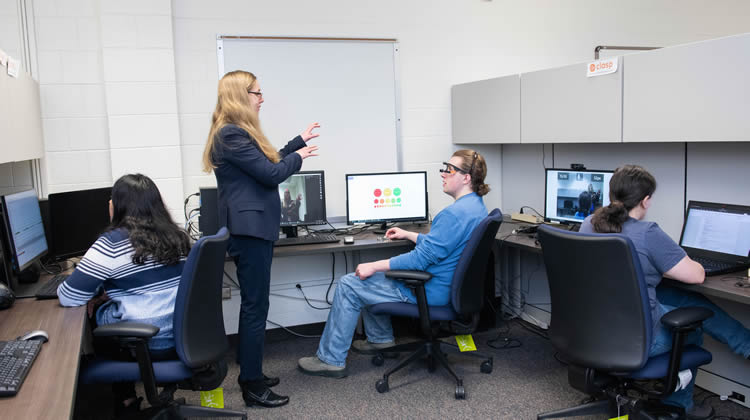Department of Psychology


Department of
Psychology
- RIT/
- College of Liberal Arts/
- Academics/
- Departments and Schools/
- Department of Psychology
Overview
The Department of Psychology offers coursework and programs that help you develop skills for your future career and lifelong learning, including critical thinking and professional communication. The department offers opportunities to join cutting-edge research and programs that are advancing study in a host of fields. We provide an environment where faculty and student collaborative research thrives, expanding the knowledge of behavior, cognition, perception, and other key areas. Faculty in the Department of Psychology are teachers and scholars who work to advance the science of psychology and help you apply that science to your chosen career field.
12
Research laboratories and centers
4
Degree programs: Psychology (BS), Neuroscience (BS), Experimental Psychology (MS), Cognitive Science (Ph.D)
#1
Largest degree program in College of Liberal Arts
Latest News
-
January 23, 2025
![a white college age male sits next to a black college age female in headphones. They are both speaking sign language.]()
Alm and Fitch awarded NSF grant to study visual prosody in ASL in collaboration with Gallaudet University
Linguists face a resource gap for studying visual prosody and its grammatical and emotional functions in sign languages, and for creating AI systems capable of processing visual prosody. Faculty members affiliated with RIT’s Ph.D. program in Cognitive Science aim to fill that gap through Deaf scientist-centered research.
-
November 25, 2024
![The blue and yellow flag of Sweden appears in a blue sky.]()
International research experience in Sweden seeks to develop the AI-enhanced workplace
A new National Science Foundation grant will allow 18 RIT students to travel to Sweden and conduct artificial intelligence (AI) research that enhances the industrial workplace. The students will take part in a program of AI research, professional development, and mentorship, which includes eight weeks at University West, near Gothenburg, Sweden.
-
July 25, 2024
![Shaun Foster stands in front of a presentation screen with a blog-like display of different animation projects. The light from the projector is cast over his face, and there is a student working at his desk in the foreground.]()
RIT experts make their mark on Hollywood at digital AI summit
RIT experts in artificial intelligence, screenwriting, and digital design made their mark on Hollywood this week at one of the world’s foremost conferences on entertainment, media, and technology.
Featured Work and Profiles
-
Exploring the Language Journey of Deaf Children
Professor Rain Bosworth investigates how people learn and process sign language through studies on deaf and hearing people’s use of vision and touch. Her work suggests that babies have an innate...
Read More about Exploring the Language Journey of Deaf Children -
Psychology Professor named a Distinguished Member
John Edlund Psi Chi, the International Honor Society in Psychology, recently named psychology professor John E. Edlund, Ph.D., a Distinguished Member, the highest honor the organization bestows.
Read More about Psychology Professor named a Distinguished Member -
Empowering People Through the Power of Service Dogs
Irene Fobe '17 MS (experimental psychology), channels her research skills into a rewarding role as a service dog trainer, helping individuals with disabilities find their perfect canine companions.
Read More about Empowering People Through the Power of Service Dogs -
New Neuroscience BS: A College of Liberal Arts + College of Science collaborative offering
A new neuroscience BS degree, beginning this fall, will focus on the knowledge of how the brain works and it how to apply that knowledge to develop systems for new frontiers, such as advancing...
Read More about New Neuroscience BS: A College of Liberal Arts + College of Science collaborative offering -
Student researchers pave the way for human-centered AI advances
Student summer researchers work to build a mobile app for interactive machine learning and visualization tool to verify data in support of human-centered models.
Read More about Student researchers pave the way for human-centered AI advances -
Student Tackles the Effects of COVID on Child Development
Psychology major Finn Cohen embarks on a transformative Fulbright fellowship in Canada to investigate the effects of digital media on young children's development during COVID.
Read More about Student Tackles the Effects of COVID on Child Development
Undergraduate Degree
The undergraduate program integrates a traditional psychology curriculum with a unique science and technology focus. Courses in experimental, developmental, abnormal, and industrial/organizational psychology foster the development of your analytical skills and encourage critical thinking, while a professional/technical core builds knowledge in a relevant area outside of psychology such as criminal justice, business, mathematics, computing, or engineering. The unique curriculum offers five tracks of in-depth, interdisciplinary study in developmental psychology, biopsychology, clinical psychology, cognitive psychology, and social psychology, allowing you to specialize in two areas of interest.
In the neuroscience BS degree, you’ll learn how the brain works and apply that knowledge to develop systems for new frontiers such as advancing artificial intelligence, combating neurodegenerative diseases, and assisting those with learning disabilities.
This degree program is offered jointly between the College of Science and the College of Liberal Arts.
Learn more about the Neuroscience BS programOur psychology BS provides a scientific study of the brain paired with a focus on observing, experimenting, and analyzing the mind to understand what drives human behavior.
Learn more about the Psychology BS programGraduate Programs
A graduate degree in psychology can lead to advanced career prospects. Our master’s program combines focused coursework in psychology with applied experience, either through an internship or the completion of a research study and master’s thesis.
Work is underway to offer a new Ph.D. in Cognitive Science program that will provide innovative research training and career-building experiences centered around engineering, computing, and social and behavioral sciences.
RIT’s cognitive science Ph.D. provides an interdisciplinary study of the human mind that combines insights from psychology, computer science, linguistics, neuroscience, augmented reality, and philosophy.
Learn more about the Cognitive Science Ph.D. programIn this engineering psychology program, you’ll explore the interactions between humans and machines, and the science behind human behavior as you prepare for a career in ergonomics, cognition, perception, design, and more.
Learn more about the Engineering Psychology Adv. Cert. programContribute meaningful work to multiple fields of psychology while you explore and apply scientific methods to human development, social interactions, and behavioral relationships in an experimental psychology master’s degree targeted toward your career aspirations.
Learn more about the Experimental Psychology MS programPsychology Research Labs, 2024-25
For descriptions, locations, and lab director contact information, review this pdf document >
- RIT Attention, Cognition, and Emotion Lab
- RIT Child Study Center
- RIT CLaSP - Computational Linguistics and Speech Processing Lab
- RIT Cognitive Engineering and Engineering Psychology Lab
- RIT Comparative Cognition and Perception (CCP) Lab
- RIT Developmental Psychopathology and Serious Mental Illness Lab
- RIT Health and Addictions Research Center (HARC)
- RIT Human Perception and Performance Lab (HPPL)
- RIT Meaning, Language, and Cognition (MLC) Lab
- RIT Neurobehavioral Lab
- RIT PADME Lab (Psychopathology, Adolescence, Development, Methodology, Evaluation)
- RIT Perception & Acquisition of Words (PAW) Lab
- RIT SCAPE Lab (Social Cognition Across People & Environments)
- RIT Social, Methods, Evolution, and Legal Lab
- NTID deaf x lab
- NTID Perception, Language & Attention in Youth (PLAY) Lab


















